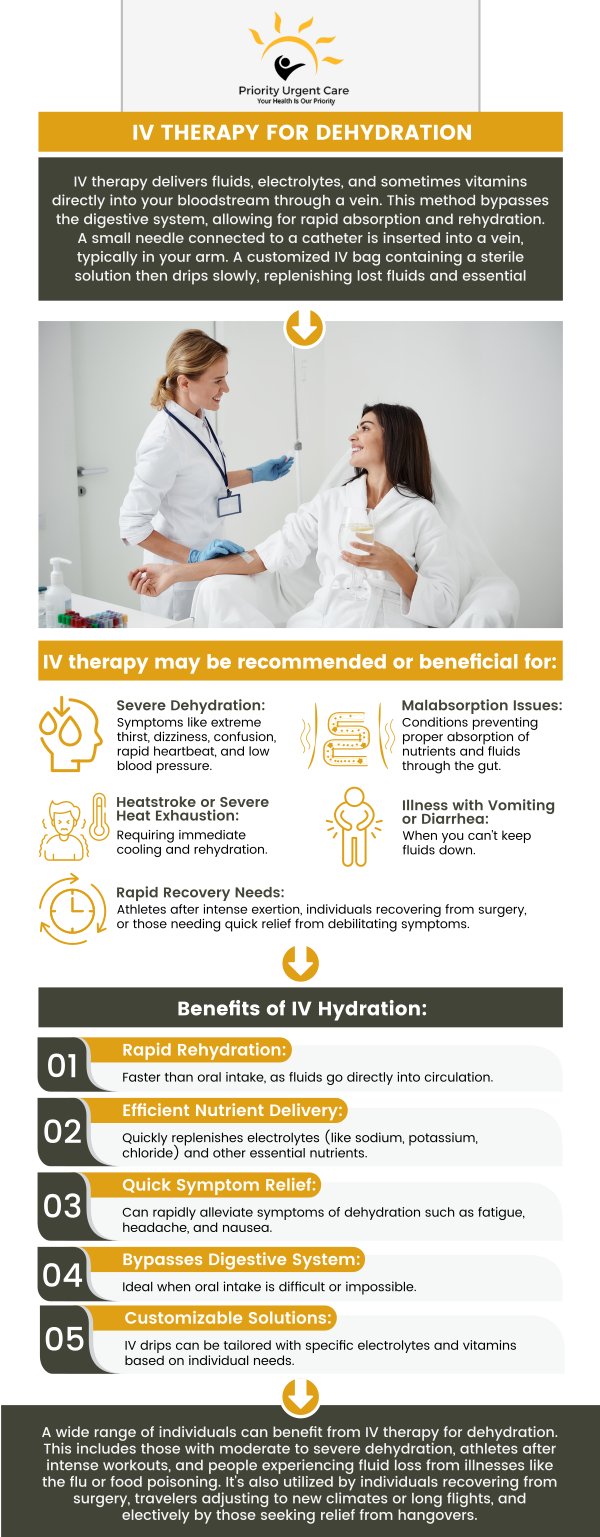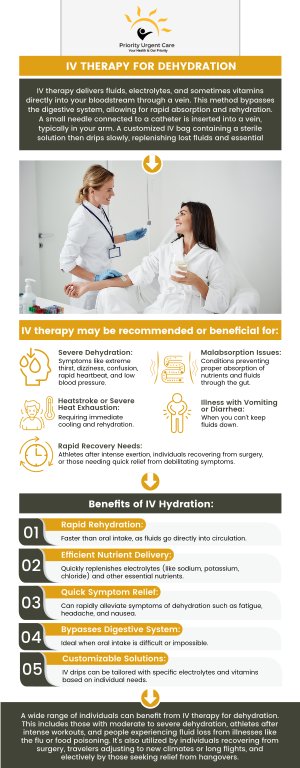Can Urgent Care Give IV Fluids for Dehydration?
Yes, if you are looking for intravenous administration of medications, then contact Priority Urgent Care and Walk-In Clinic, where our professionals are experienced in this process. For more information, please Contact us or book an appointment online. We have convenient locations to serve you in Cromwell, CT, East Haven, CT, Ellington, CT, Newington, CT, Oxford, CT, Unionville, CT and Wallingford, CT.




Table of Contents:
What medicines are typically given by IV?
Why do medical professionals give medicine intravenously?
What are the benefits of IV Fluids?
Why are dehydrated patients given saline?
Taking medications orally is not as effective as other methods, as passing through the digestive system lowers the absorption rate of oral medications. The same is true for drinking fluids; much of the liquid consumed does not adequately contribute to the body’s hydration levels. Fortunately, there are more effective methods available, such as an IV drip or push. This technique can bypass the digestive system and deliver medications or fluids directly into the bloodstream for quick and effective action.
Many different types of medications can be given by IV, from analgesics to antibiotics. Medications administered by this method include:
Chemotherapy drugs, such as:
• Doxorubicin
• Vincristine
• Cisplatin
• Paclitaxel
Antibiotics, such as:
• Vancomycin
• Meropenem
• Gentamicin
Antifungal drugs, such as:
• Micafungin
• Amphotericin
• Pain relief medications, such as:
• Hydromorphone
• Morphine
Drugs for low blood pressure, such as:
• Dopamine
• Epinephrine
• Norepinephrine
• Dobutamine
• Immunoglobulin medications (IVIG)
IV injections are one of the quickest and most controlled ways to deliver medications or other substances into the body and are often the preferred method of administration used by medical professionals when:
• A person needs a life-saving medication
• A person needs a very accurate dose
• A person needs a large dose of medication over an extended period of time (the dose can be controlled to be released over a specific duration)
• Taking medication by mouth is ineffective
• A person would otherwise require multiple injections
• A person cannot eat or drink
There are many benefits of IV, including:
• Provides the most complete drug availability
• Comes with a minimal delay of efficacy
• Constant plasma concentrations can be obtained at a required level by controlling the administration rate
• Unexpected side effects that occur during the period of delivery can be halted by stopping the infusion
• Compounds poorly absorbed by the gastrointestinal tract may be administered intravenously to be more readily absorbed by the body
• Compounds that cause a significant amount of pain when administered intramuscularly or subcutaneously may present no issues when delivered intravenously, presenting a unique advantage for this method of delivery
Saline, also referred to as a saline solution, is the most commonly used intravenous fluid, and is composed of a sodium chloride-water solution. Although roughly 60 percent of the body is made up of water, if it is directly injected into the blood, it might cause dilution of essential electrolytes. If water was directly injected into the bloodstream it would also result in an osmotic effect in blood cells, causing them to rapidly expand to the point of membrane rupture. This results in the cells’ contents spilling into the plasma, which can cause damage, and if substantial enough, may result in death. A small amount of water injected directly into the blood would not cause lasting harm, but if a large amount of water was, it could result in catastrophic damage. In general, the more water injected into the blood, the higher the number of damaged cells, resulting in a higher risk of permanent complications.
Water is mixed in a solution of sodium and chlorine of roughly the same concentration as blood plasma to avoid harm caused by plain distilled water on blood cells. Saline solution is specially formulated to match the electrolytes present in blood plasma which causes less of an osmotic effect than other IV fluids.
If you require medications or fluids delivered intravenously, come to Priority Urgent Care and Walk-In Clinic today. Our medical professionals can help you restore proper hydration or absorb a higher amount of your medication with our IV therapy. We serve patients from Cromwell, CT, East Haven, CT, Ellington, CT, Newington, CT, Oxford, CT, Unionville, CT, Wallingford, CT, and BEYOND!

Additional Services You May Need
▸ Urgent Care
▸ DOT Physicals
▸ Worker’s Injury Treatment
▸ Drug Testing
▸ Physical Exams
▸ School/Sports Physicals
▸ Sports Injury Treatment
▸ X-Ray Services
▸ Pediatric Urgent Care
▸ Poison Ivy
▸ STD Testing
▸ Immunizations & Vaccinations
▸ Lab Testing
▸ Pre-Employment Physical
▸ Employer Services


